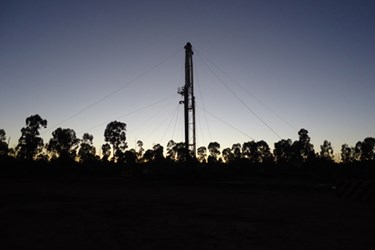Has Fracking Gone ‘Green'?
By
Kevin Westerling
@KevinOnWater

There are few topics more controversial these days than hydraulic fracturing ("fracking"). While the debate rages on as to whether fracking poses a risk to water quality, a new desalination technique addresses two other environmental concerns: water scarcity and greenhouse gas (GHG) emissions. Developed by researchers at the University of British Columbia (UBC), the breakthrough technology uses excess carbon dioxide created in the fracking process to desalinate the process water, making it available for water reuse. It also generates chemicals — hydrochloric acid and carbonate salts — that are valuable for many industrial applications.
The UBC team has received $500,000 from the Climate Change and Emissions Management Corporation to commercialize the technology, which is described as a low-energy dialysis (membrane) system. According to global information company IHS, the U.S. market opportunity for water management in oil and gas (O&G) is expected to grow from its current $8-billion status to $38 billion by 2022, with $11.2 billion tied directly to fracking. Shale gas plays aren’t as plentiful or mature in the researchers’ home base of Canada, but shale formations in Alberta show considerable potential for the future.
Advanced Technology, Simple System
The system features a modular design, allowing for operational flexibility and off-the-shelf use, but it also represents a technology breakthrough. It generates its products — desalinated, reusable water and marketable chemicals — through novel utilization of ion-selective membranes and electric/chemical concentration differential.
The technology seeks to replace current desalination methods such as evaporation and reverse osmosis, which are energy-intensive, do not create a commercial byproduct, and only contribute to GHGs.
Environmental Impact
The U.S. EPA cites “well-documented air quality impacts in areas with active natural gas development,” with data supported by the Greenhouse Gas Reporting Program. In 2012, the Petroleum and Natural Gas Systems Sector reported a total of 217 million metric tons of CO2e, or “carbon dioxide equivalent” units.
On the water side, the EPA is in the midst of a comprehensive study on fracking’s impact on water resources, and while there is certain controversy around the impact on water quality, the impact on quantity is much easier to perceive. Even Halliburton, a sure proponent of hydraulic fracturing, reports that “fracking consumes vast amounts of water — typically millions of gallons for every well drilled.” In areas such as Texas, home to both thousands of fracking wells and extreme drought, water stress is a major concern.
Professor David Wilkinson, leader of the UBC research team, predicts that this new innovation, if widely adopted in Alberta alone, could “remove several megatons [1 megaton = 1,000,000 metric tons] of carbon dioxide and conserve several billion liters of water every year.”
“A lot of technologies look at these issues as two separate problems, but we are simultaneously addressing both of them,” Wilkinson stated.
Commercialization And Adoption
First things first, the technology has to be proven effective for a full-scale O&G operation. The $500,000 in grant money awarded to UBC — one of only 24 winners from more than 340 worldwide submissions — will be used, in part, to develop a commercial-scale dialysis cell and demonstrate it on real-world wastewater.
Once its efficacy is proven, successful commercialization will be dependent on market acceptance. While “green” initiatives aren’t always thought of as a top priority for O&G companies, there are two catalysts that could promote adoption of this innovation: stricter government regulation of GHGs, and the opportunity to sell the chemical byproducts.
If “going green” means making more money, the O&G sector will be all for it.
Image credit: "CSG drill rig, Pilliga Forest, July 2011," lockthegate © 2011, used under an Attribution 2.0 Generic license: https://creativecommons.org/licenses/by/2.0/
Copyright © 1996 - 2014, VertMarkets, Inc. All rights reserved. To subscribe or visit go to: http://www.wateronline.com